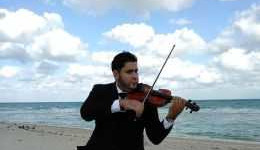Jose R




Instruments: Piano, Violin, Viola, Ukulele, Electric Violin, Music, Keyboard, Classical Guitar
Styles: Classical, Jazz, Pop, Gospel, Latin, Spirituals, Latin Jazz, Bossa Nova, Mariachi


Jose R



Instruments: Piano, Violin, Viola, Ukulele, Electric Violin, Music, Keyboard, Classical Guitar
Styles:
Classical, Jazz, Pop, Gospel, Latin, Spirituals, Latin Jazz, Bossa Nova, Mariachi
Where I Teach:
Ages Taught: 5-80
UNIVERSIDAD NACIONAL EXPERIMENTAL DEL TÁCHIRA “UNET” (2014), Venezuela, Degree in Music COUNTERPOINT AND FUGUE COURSE LEVEL I, II and III (2013), Venezuela ORCHESTRAL CONDUCTING COURSE (2013) SCORING AN ORCHESTRATION COURSE (2014) COMPLEX HARMONY AND DODECAPHONISM COURSE (2014)
BUTTON AND RECOGNITION FOR 8 YEARS OF SERVICE WITH TYPICAL TACHIRA ORCHESTRA (2015) RECOGNITION AND PLATE AS BETTER CULTURAL PENITENTIARY COORDINATOR (2012) RECOGNITION AND PLATE FOR MANAGEMENT AS EXECUTIVE DIRECTOR OF CEFMAVEN Adventist Music School (2013), San Cristobal, Venezuela 1st PLACE PERFORM IN THE FIRST BINATIONAL UNIVERSITY FESTIVAL (2005), Cucuta, Colombia
I consider myself very professional in what I do, I love music since I was little since 1993 and all my life I have dedicated it to this beautiful art. I was formed by the orchestra system of Venezuela, to which I dedicated as a student and then as a teacher a large part of my life, going on national and international concert tours. I was in charge for several years of a music school as executive director in San Cristobal, Venezuela, and as musical director of the Adventist orchestra of Venezuela Tachira headquarters (2012-2015). I was also 8 years as a violinist in the typical orchestra of tachira in venezuela (2008-2015)
I have experience for more than 14 years teaching, where I had the great honor of forming a very good generation of musicians that today play with children, youth and high level orchestras in Venezuela and in other parts of the world. I was the founder of the system of Adventist orchestras in my country and I was part of the formation and direction of more than 300 young people during the 2 years that I was in charge of the first school of Adventist music of Venezuela which was created in San Cristobal, state of Tachira
For beginner students of violin I always start with the suzuki method and alternate it with the "The new directions" method, while after 3 or 4 weeks I start with some repertoire according to how the student evolves. In the case of piano I start with John Thompson's methodology "Teaching little fingers to play", alternated with exercises of the book Junior Hanon for piano, I try to evaluate the student qualitatively before quantitatively at least once a month. Of course in adults the methodology can not be the same as for a child, since normally depending on the age, it will be more developed or less the cognitive part, depending on the age it will be the type of pedagogy used, for example in children from 5 to 10 years old the level of requirement is less than one between 10 and 15 years. In adults, progress will depend if you have developed a musical and rhythmic ear
I like that my students learn quickly and in the easiest way possible. I try to motivate them by doing recitals and presentations so that they learn the discipline and constancy that involves learning to play an instrument, I try to teach technique together with repertoire from beginner to advanced level in violin and viola, and from beginner to intermediate level in piano, guitar and cello, I am patient but demanding at the same time and according to how my students are progressing. It is rewarding when a student progresses satisfactorily and begins to feel that passion for music and to continue overcoming challenges. As a teacher my biggest challenge is to get the student to feel comfortable with his instrument and get a good rhythm of study that allows him to develop all his abilities. All students are different, which is why different pedagogical strategies must be applied according to the case

